
Railway

This is the sign which was in use when Winslow station closed on 30 Dec 1967.
Arthur Clear: A Thousand Years of Winslow Life (1888), p.20
In conclusion we can only briefly refer to the events of recent years. In 1841, the Boys' School was built. In 1843, the Town was first lighted with Gas. On the 25th March, 1850, an experimental trip was made on the newly-formed Buckinghamshire Railway, Mr. Brassey, the Contractor, provided a Dinner for the directors and friends, to the number of 150, at Winslow, when Sir Harry Verney spoke, and on the first of May following, the line was opened to Winslow, there being four trains each way daily.
According to Lipscomb, Winslow in the 1840s was a depressed place which had been reduced "to the condition of a mere village", so the arrival of the railway was especially significant.
See Railway proposals 1845 for 3 alternative schemes which would have put Winslow on different routes, but were all abandoned by 1846 when the Oxford and Bletchley Junction Railway was established by act of Parliament, becoming the Buckinghamshire Railway in 1847. The exact route was in some doubt, leading to the following petition with about 300 signatures.
TNA, RAIL 555/3: petition dated 2 July 1846
To The Directors of the intended Railway from Oxford to Bletchley
We the undersigned Inhabitants of the Town of Winslow and the neighbouring parishes beg leave most respectfully to draw your attention to the proximity of the Town of Winslow a market and post Town having annually Eleven important cattle and other fairs to the line of your intended Railway and to express to you our anxious wish that a first class station should be erected as near as conveniently may be to the junction of the Turnpike and Great Horwood roads at the end of the Town towards Buckingham a situation which would not only be beneficial to the Town by saving the heavy expence of carriage of coals and merchandise from and to a more distant station, but would also in our opinion be most convenient for the inhabitants of a number of considerable villages in the immediate vicinity, and at the same time the best calculated to increase the traffic on the Line
Dated this 2nd day of July 1846.
[The signatures are arranged in five columns]
[Col.1] W. Selby Lowndes, E.W. Selby Lowndes, John Morecraft, Phil Dauncey, Adam Baynes, Thos F. Fremantle wishes also for a second Class Station at or near Mursley between Winslow and Bletchley, Dav Tho Willis, Jno Cowley, George Hinde, Alfred Barton, J M Scott, ?Abbirt Luke ?Lyton, Richard Brise, Benjn ?Baxter, Josiah Bright, Benj King, William Pitkin, Eg+++ ?Niles, Thomas ?Slett, Grant Harris, Thos P Jones, Samuel Cole, Thomas Leeson, Benjn Parrott, J.C. Barrett, John Clare, George Viccars, Joseph Barton, Edmund ?Kimose, Frederick Dancer, John Wake, William Corbett, John Stevens, Richard Seager, Robert ?Cull, Robert Corbett, Saml Boneham, John ?Jolly, Wm Burgess, Charles Monk, David Twining, Thos Morecraft, Willm ?Mason, Grant King, Daniel ?Grace, John King, JL French, Thomas Woodward, Henry Evans, Simon Higgins, William Elley, George Viccars, Daniel Hobbs, William Hughes, Thos Jones, Wm Viccars, T Basil Jordan, J.S. Brickwell, Rd Allen
[Col.2] Geo. Cowley, Richard Baldwin, George Kennings, John Matthews, W.W. McCreight Vicar of Winslow, Revd Charles Kerr Winslow, William Neal, Joseph Grace, John Blake Neal, Henry Sellar, Emmanuel Roads, Roseman Toms, Richard Sharp, Benjn Sharp, John Brownett, George Cross, Alfred Barton, John Cross, Henry Wigley, James Hazzard, Wm George, Edward Gray, John St Tho Wynter, George Mayne, James Brooks, George Maydon, Geo West, John Lomath, Joseph King, Richard Coxill, Edward Sear, William Forster, James Alexander Hinton, John Corkett, Richard Gibbs, John Dumbleton, James Tuckey, Richard Dumblton, Robert Gurney, James Spicer, Wm Ingram, Wm Scott, John Woodward senr, Jeremiah Lloyd, Joseph Price, Robert Price, George White, Henry Price, Henry Holden, William Wyatt, James Holden, Timothy Gaskins, Thomas ?Walter, Stacey Keys, Thomas Syratt, George Grainge, George Illing, Ishmael ?Munyas, Francis Philips
[Col.3] R.W. Jones, William Lomath, William Coxill, Revd M. Kerr, John Ingram, Charles Scaldwell, John Mayne, Thomas Lee, Thos Lomath, William Kempster, John Bathe, John Craker, Thomas Roads, Edwd Abbott, Charles Keys, George King, Robert Ossitt, Robert Evans, Joseph Lee, John Abbott, John Curtis, John Bull, Thomas Clark, John Emmins, John Cawte, Henry Cheney, Thomas Smith, William Seaton, George Harrup, Joseph Stevens, William Jennings, Joseph Bowden, Danel Holt, Joseph Bowden, Thomas Bonner, Tho Matthews, Saml Greaves Dudley, Benjn Cole, Joseph Biggs, Thos Ingram, Luke Dancer, Michael Price, John Price, John Ward, Richard Webb, William Nash, Thomas Clark, George Carpenter, Robert Gurney, Henry Lines, James Buckingham, John Tattam, Jesse Stonell, S G Aveline, William Anstee, Frances Walton, John Willmer, Thomas Ash, John Illing, Robert Eden, George Illing Snr
[Col.4] Wm Wagstaffe, James Hawley, James Morgan, William Eade, ?E.W.French, John Smith, W J Jones,Saml B. Dudley, James Toy, James Brinkler, Josiah Baker, John Baker, Thomas Ward, Joseph Price, James Linney, Joseph Price, Richard Redding, Thomas Redding, Thomas Scott, John Biggs, Joseph Kingham, James Butcher, John Buley Field, A.J. Whitfield Vicar of Granborough, Joseph Ingram, Joseph Foster, Wm Dancer, John Dytum, Fredck Clarke, Thos Cranwell, Edward Dancer, Matthew Holt, James Tattam, James North, Charles Ward, James ?Seaton, John Dancer, William White, Edward Dancer Senr, Thomas Burton, John Mander, Henry ?Burrell, Wm King, Thomas Edwin, Edmund Edwin, John Doe, Thomas Seaton, John Price, John Ash, John Deverell, Robt White, John Belgrove, George Belgrove, James Forster, William Course Senr, William Course junr, Henry Gascoigne, Thomas Quainton
[Col.5] Geo J Collinson Vicar of Swanbourne, Thomas Bowler, Sam(ue)l Gam(aliel) Aveline Sen(io)r, John Green, Thos Cross, John Colgrove, William Brise, William Brooks, Daniel Walker, Robert Varney, William Miller Junr, Wm Miller Senr, Dancer Daniel, John Hollis, William Leas, Thomas Burgess, William Burgess, George Dibdin, Willm Hy Lomath, WS Bowen, Matthew Adams, R.R. Ford Clerk - Addington, Thomas Tompkins, James Short, Richd Perkins, Thomas Everett, Richard Gough, William Kent, Robert Corbett, Georg Smith, Benjamin Barton, Robert Young, William Hawley, William Short, John Barge, Thomas Jones, Thomas Willis, Thomas Conniborough, Thos Viccars, Henry Harrup, Thomas Line, John Grace, Hewiett Harris, William Ridgway, William Sirett, John Capp, Richard Holdham, Wm Selbie, David Archard, Henry Dancer, Joseph Willison, Edward Emerton, John Linnall, Francis Clarke, Robert Ridgway, John Grainge, Francis Hale Grainge, John Leeson
Bucks Herald, 30 Jan 1847: setting up the route
WINSLOW. – OXFORD AND BLETCHLEY RAILWAY. – During the last week Francis Sanders, Esq., agent to the London and North Western Railway Company, and S. B. Dudley, Esq., of Winslow on the part of various proprietors of land, through which the Oxford and Bletchley is about to be constructed, were engaged at the Bell Inn, in determining the claims and adjusting the compensation to be paid to the several owners. Every thing pertaining to the concern was most agreeably conducted, and the greatest satisfaction to the parties, for whom they were the representatives, was the result of their negotiations.
The foreman of the bricklayers working on the railway was Samuel Bates who revived the Baptist cause in Winslow.
Bucks Herald, 13 May 1848: death of a worker
WINSLOW. FUNERAL OF A RAILWAY NAVVY.- Lately, at Winslow, the body of John Noyes, late time-keeper to Mr. E. Arblaster, a contractor on the Winslow Line of Railway, was interred in the churchyard. He was followed by 60 of the railway men, and by nearly 300 of the inhabitants of Winslow, who showed a great respect for deceased, as he bore an excellent character in the situation he filled. He was in the 30th year of his age.
The surname is given as Nourse in the Civil Registration Index, and can't be traced in the GRO Online Index.
Northampton Mercury, 26 Aug 1848: a setback
SINKING OF A BRIDGE ON THE BUCKINGHAMSHIRE RAILWAY. – The centre pier of a four-arch bridge on the Buckinghamshire Railway at Addington Planks, about two and a half miles from Winslow, sank about two feet on the 17th inst., and it was only by “shoaling up” and propping that it was saved from falling. It was built on a boggy foundation. The bridge must come down and be re-built.
Bucks Herald, 30 June 1849: policing
SWEARING SPECIAL CONSTABLES.- Messrs. Tierney and Wilmot were again sworn in as special constables for the Winslow and Buckingham railway lines, and C. Hodgson was sworn in for the Mursley line.
Bucks Herald, 25 Aug 1849: bridge begun
RAILWAY STATION. – Considerable progress has been made in erecting the station-house and other buildings on the railway here. The bridge also over the railway, on the Buckingham road, is begun; and we understand that the whole line will be completed by the 1st of March next.
Bucks Herald, 22 Sep & 20 Oct 1849: accidents
W I N S L O W. ACCIDENT. – An accident of a serious nature happened at the railway station here last week to two carpenters at work there, a very large door falling down by some means on them, and although much crushed and hurt fortunately no bones were broken.
An accident happened to a labourer, named David Watts, while working on the railway line on Tuesday last, when a large quantity of earth fell on him and broke the poor man’s thigh. Messrs. Cowley, surgeons, were sent for, and were soon on the spot, and in three-quarters of an hour the bone was set, and the sufferer is going on favourably. It is a singular fact that this is the only case of broken bones that has happened on the Winslow line since the commencement.
Bucks Herald, 30 March 1850: the railway opens
BUCKINGHAM RAILWAY
This line being now so far advanced that it can be travelled upon, the contractors, Messrs. Brassey and Co., and other gentlemen connected with this undertaking, went over it on Tuesday, last, from Bletchley to Banbury, in a train, consisting of several carriages and on their return stopped at the Winslow station to a dinner, given by the contractors, and which was on the most liberal scale. The whole of the building was very neatly and appropriately decorated for the occasion with flags and laurels. &c. Amongst the former we noticed the following:- Success to the Supporters of the Railway;" "Success to the Bucks Railway;" "Health, Wealth, and Long Life to Thomas Brassey;" and "Success to the Winslow Station."
The dinner was laid out in a handsome tent in the Good's shed, and which consisted of every delicacy of the season; indeed no expense appeared to have been spared on the occasion, and all was arranged under the good management of Mr. Neal. landlord of the Bell Inn, in such an excellent manner as to entitle him to much credit. Shortly after three o'clock, the company, consisting of about 120 gentlemen, sat down to dinner, T. Brassey, Esq., in the chair. Amomg the company, we noticed - Cobb, Esq., Major
Dewes, H. Humphreys, Esq., and other Directors, the Rev. W. Fremantle, R. Chandler, Esq., Mayor of Buckingham. - Gough, Esq.. Mayor of Banbury, W. Stone, T. Bartlett. G. Nelson, H. Smith, G.H. Haslop, P. Box and Thomas Swain, Esqrs., of Buckingham; several gentlemen from Brackley; G. Cowley and B. Dudley, Esqrs., and other gentlemen of Winslow and its neighbourhood. After the usual loyal toasts and other appropriate ones had been drank, and some spirited and suitable speeches had been delivered, the chief portion of the company soon after, six o'clock left to return by the train, no doubt highly delighted with their excursion
On Wednesday, a substantial dinner was provided in the same tent, to the sub-contractors, clerks, time-keepers. and all the navvies employed on the line, and they as well as all partook of the contractor's liberality, seemed to be highly delighted. About 600 more of the same class of men employed on this line were likewise entertained at Brackley, on Thursday, with a good substantial repast, and a good allowance of ale.

Winslow's disused station in 1989, before demolition
Bucks Herald, 11 May 1850: new business
JOSEPH HOWARD RESPECTFULLY informs the Inhabitants of WINSLOW and the Neighbourhood, that he has made arrangements for a SUPPLY OF COALS, AT WINSLOW STATION WHARF, on the OPENING of the BUCKINGHAMSHIRE RAILWAY, on WEDNESDAY NEXT, the 15th instant, which for Quality and Price he trusts will give general satisfaction, and requests the favour of their Patronage and Support.
J. H. returns his sincere thanks for the very liberal support he has received at AYLESBURY, which concern he will continue as usual.
Aylesbury, May 8, 1850.
Bucks Herald, 31 Aug 1850: another fatality
FATAL ACCIDENT. – On Thursday week, the 22nd instant, a most distressing accident occurred to a poor labourer employed at the Winslow Station of the North Western Railway. It was the duty of the deceased to attend to the greasing of the wheels of the ballast waggon; and it appears that he was in the act of doing so, and had examined one side of the train, and, instead of going round it, he passed between two of the waggons, when the train was suddenly put In motion, and the poor fellow was completely crushed. He was removed, but life was quite extinct. An inquest was held on the body by Mr. D. P King, coroner, of Buckingham, and a verdict of “Accidental Death” was returned.
Bucks Chronicle, 5 Oct 1850: a boost to trade
WINSLOW CATTLE MARKET.
PERIODICAL SALE OF LIVE AND DEAD FARMING STOCK, &c., &c.
Mr. James King
RESPECTFULLY announces that, at the solicitation of several gentlemen of the Neighbourhood, he has determined on Commencing a Periodical Sale of Farming Stock.
To be held on the WINSLOW CATTLE-MARKET-DAY, the SECOND and FOURTH THURSDAY in EVERY MOKNTH.
T H E F I R S T S A L E WILL TAKE PLACE, I N T H E M A R K E T,
On Thursday, the 10th day of October, 1850, AT ELEVEN O’CLOCK.
From the situation of Winslow in the centre of a great Stock District, and the facility and cheapness of transit afforded by the Buckinghamshire Railway, it is anticipated that the advantages offered by the establishment of a Periodical Sale are such as to ensure its permanency.
It is requested that gentlemen having Stock to dispose of at these Sales will send particulars thereof, one week prior to the Sale, to the office of the Auctioneer, Market-square, Winslow.
The terms will be very moderate; and everything Sold will be paid for at Three o’Clock the same day.
Winslow, 25th September, 1850.
Bucks Advertiser and Aylesbury News, 21 Dec 1850
The difficulty of working a line with a single road of rails is now apparent, and notwithstanding the advantage of the electric telegraph for communication between the various stations, punctuality is not to be found. A train wrong makes others the same, and some days not one is at the station at the time pointed out on the tables. As they can only pass at the stations, it is necessary, in order to avoid collisions, to keep, in case another train should be due, passengers waiting at the station till the line is clear. Thus, as on Thursday last, a train due at Banbury might be seen at the Buckingham station waiting for the up train for Bletchley, due at Buckingham. The traffic is now great, and we shall be disappointed if we do not ere long see the whole line with double rails.
Bucks Herald, 16 Nov 1850: the first fare dodger
A GENTLEMAN WITHOUT HIS TICKET! – On Tuesday last, Master Eastern was summoned by the Railway Station Master, Stainson, for riding from Winslow to Buckingham, he not having paid his fare. – Fine and costs, £1:10 inflicted. – The defendant paid the money.
Banbury Guardian, 20 Feb 1851: Station Inn opens
THE STATION.- Travellers to and from the Winslow Station have now the advantage of a house of public entertainment, where provisions are attainable. The Station Inn is now open, and is found both useful and convenient.
RAILWAY LOADING.- The station-yard presents the appearance of a timber depot. The large fall from the estate of W. S. Lowndes, Esq., at Whaddon, is now in course of transit to London and Sunderland, for Government purposes.
The original Buckinghamshire Railway line ran from Bletchley to Banbury, but the line through to Oxford was opened on 1 July 1851, and it became part of the Oxford to Cambridge route. Winslow was the place for changing trains between the Oxford and Banbury lines until Verney Junction station opened in 1868. The first stationmaster was William Hazelgrove from London, b.1815 or 1816.
A burglary in Winslow in February 1851 was blamed on people being able to come to the town easily from London, so the effects weren't all seen as positive.
The Oxford Journal recorded an "excursion train" on 12 July 1851 from Banbury via Brackley and Buckingham to London which "had about 700 passengers when it left the Winslow station." Here is the advert (Banbury Guardian, 10 July 1851):
London and North Western Railway.
CHEAP EXCURSION TRAIN TO THE
G R E A T E X H I B I T I O N.
From Banbury to London and Back.
An Excursion Train will leave BANBURY for LONDON, on the Afternoon of SATURDAY, the 12th JULY, at Half-past Three o’Clock.
Leave Banbury, 3.30 pm, Brackley, 3.45, Leave Buckingham, 4.0 pm, Winslow, 4.15
The Return Train will leave the Euston Square Station on the Evening of the following Tuesday, the 15th July, at 7 o’clock.
Fares from all the above Stations for the Double Journey,
First Class. 7s. Second Class. 4s. 6d.
By Order, MARK HUISH.
NOTE FOR PASSENGERS TO THE CITY – The East and West India Dock Railway is now open, and Passengers may alight at Camden Town and proceed by Rail to Fenchurch Street. Fares from Camden Town to Fenchurch Street: - First Class, 6d; Second Class 4d.
Bucks Chronicle, 18 Oct 1851: alleged theft
This case from the Bucks Quarter Sessions gives an impression of what the station was like in its early days. Jesse Cowley was originally from Castlethorpe, and lived in Buckingham Road in the 1851 Census. Despite the verdict, this incident probably ended his railway career as in 1861 he was a shoemaker in Newport Pagnell.
Jesse Cowley, 35, charged with having, on the 20th day of August last, at Winslow, feloniously stonlen six knives, of the value of two shillings, and six forks, of the value of one shilling, the property of the London and North-Western Railway Company.
Mr. Power prosecuted. He stated that the prisoner was a porter at the Winslow railway station, and that he had stolen the goods in their transit.
Mr. Browne defended the prisoner.
Charles Gwynne – Am a constable in the railway police; in consequence of information, I was watching at the station at Winslow for a fortnight; at six o’clock on the morning of the 26th of August the prisoner was unloading some trucks into a waggon, and it went away; I was then in concealment; I afterwards saw the prisoner go from the goods-shed to the station-house with some papers; he afterwards crossed the road leading to Winslow, and then turned back to the goods-shed which he had left about five minutes; he then got upon the stage and looked about him; I then saw him crawl upon his hands and knees under the stage and bring out half-a-dozen black handled knives and forks; he rolled them up in a piece of brown paper, and put them under his jacket, which he buttoned up; watched him, and he went to his house, about a quarter of a mile off; when he came back to his work I went to him, and charged him with stealing half-a-dozen knives and forks; he said “Do you, sir;” I then took him into custody; left him in charge of a person named King and went to his house, where I saw his wife, and on searching found half-a-dozen black-handled knives and forks under the sofa cushion; they resembled those I had seen him take; as I was taking the prisoner to the lock-up, he told me that he was over head and ears in debt, and that was the reason he took the knives and forks. [The knives and forks were here produced, as also were some others the policeman had received from George Freeman of Oxford, on the same day the robbery was committed].
Cross examined – The knives and forks were such as those commonly used by men in the same station as the prisoner and myself, and probably in gentlemen’s kitchen; while watching, I was concealed under some tarpauling with some fowls; this was in a corner near the goods’ stage; some parties might have known that I was there; I went to “roost” about nine o’clock in the evening, and left my place of concealment about eight in the morning; I was under the tarpauling when I saw the prisoner steal the knives.
By the Court – The knives and forks I found in the prisoner’s houses were quite new, and did not appear to have been used.
Mr. Hazlegrove, the station master at Winslow – I was aware that Gwynne watched the premises under the tarpauling; he did so under my direction; the prisoner came to me and wanted me to go to the good-shed and look at a parcel; I did so and a parcel containing knives and forks apparently burst open; he said the parcel arrived in that state; told him to make a note on the parcel and also in his book as to the condition in which it arrived; the parcel was directed to Mr. Freeman, of Oxford, and was forwarded to him the same day.
Cross-examined – The prisoner has been in the employ of the company about 12 months, and had previously borne a good character; others might have seen the policeman go in and out of the station; but I do not think he was known to be a “detective.”
Thomas Wood – Am agent to Messrs. Pickford at Oxford; remember a parcel directed to Mr. Freeman coming to the office on the 21st of August; it was wrapped up with half-a-dozen knives and forks under the string; it had evidently been burst; Mr. Freeman came and examined the parcel and there was half-a-dozen short.
George Freeman – On the 21st of August last I was at Oxford; I had previously purchased some knives and forks of Mr. Twigg, of Sheffield; on that day, I went to Messrs. Pickford’s office, and found that half-a-dozen black handled knives and forks were missing from the parcel.
William Twigg – Am a manufacturer at Sheffield; remember receiving an order from George Freeman, for some black handled knives and forks; sent them, but had not sent any others of that class along that line of railway about that time; the knives produced are some of those I sent
Cross-examined – I make many thousand knives and forks of the class produced.
Mr. Brown then addressed the jury in behalf of the prisoner, contending that they were not justified in finding the prisoner guilty on the unsupported evidence of the policeman.
Not Guilty.
Oxford Chronicle, 3 Jan 1852: another accident
ACCIDENT.- On Wednesday morning last there was a crash at the Winslow station, caused by the down coal train to Banbury stopping at the station to shunt some trucks to be left. While the men were so doing the goods train for Oxford came down the same line and went against that portion of the previous train that was standing on it. On observing that a collision was inevitable, the stoker and fireman jumped from the engine and escaped. The engine was thrown on its side across the line, the guard’s break was smashed, as were also several of the trucks, and the coal thrown about in all directions. The line was impassable during the day, traffic being carried on by shifting the luggage and passengers across the wreck. It appears the signal lights were burning at the end of the train when the approaching one ran into it; hence we should say there was great carelessness on the part of those having charge of one, if not of both the trains.
Bucks Advertiser and Aylesbury News, 24 April 1852: dismissals of staff
The London and North Western Railway Company have given two of the porters, the policeman, and the night watchman, at the Winslow station, notice that at the expiration of 14 days their services will not be longer required. No reason is assigned for this wholesale dismissal. It is understood that the vacancies caused by the notices will be forthwith filled up.
The station was some distance from the town centre, which was lamented in this poem:
Oxford Chronicle, 3 Nov 1855
THAT Winslow's a railway and station 'tis true,
Yet there's one thing makes travellers frown.
When for "Bussy" they cry, it is found all my eye,
To take them to that quiet town.
Then through rain, wind, and dirt, though they'd fain give their shirt
For a ride, as all well can tell,
They must trudge half a mile, with blue devils and bile,
To their quarters, the old-fashioned "Bell."
A barrow and boy, are all they employ,
Your luggage to take from the station,
While woman or man, do the best they can,
At this place, - the last place in the nation.
The position of the station led to Winslow's expansion northwards. The railway enabled local farmers to send milk and butter to London on a daily basis. Some of the most enthusiastic users of the railway were members of the Whaddon Chase Hunt. There were many "hunting boxes" in and around Winslow, houses where wealthy people, usually from London, could make overnight stays and keep their horses.
Anthony Trollope, Can You Forgive Her? (1864/5), ch.17
The scene is a meet of the Roebury Hunt at the fictional village of Edgehill, Oxon.
"By George," said the literary gentleman, "just down from London by the 8.30 from Euston Square, and got over here from Winslow in a trap, with two fellows I never saw in my life before. We came tandem in a fly, and did the nineteen miles in an hour."
Oxford Chronicle, 13 Sep 1856: Telegraph service
ELECTRIC TELEGRAPH.- The British and Submarine Electric Telegraph Company are about to establish an office in this place for the transmission of messages to and from London and Liverpool and the various other towns in England and on the Continent. The work is in progress, and it is expected will be in readiness for transacting business in the course of the present week.
The Electric Telegraph Company mainly built its lines along railways. It isn't clear how you sent a telegram from Winslow at this stage. The system was taken over by the General Post Office in 1870 and details then start to be included in local directories.
Oxford Journal, 23 Oct 1858
LONDON & NORTH-WESTERN RAILWAY FARES FOR THE DOUBLE JOURNEY.
Children under 12 years of age, Half-price. |
Bicester Herald, 1 Nov 1872: theft from an office at the station
WINSLOW DIVISION PETTY SESSIONS,
WEDNESDAY, OCTOBER 23.
Magistrates present: E. S. Lowndes, Esq.,(in the chair), Captain Fremantle, and Fleetwood Lowndes, Esq.
OFFICE ROBBERY AT WINSLOW.- Levi Hamp, a boy of Winslow, was brought up in custody on remand from the previous Friday, charged with stealing a bag, value 2d, and 1s 6d in money, the property of Mr. Thomas Henry Marks, coal merchant, Winslow, on October 18. - SAMUEL WHITE said he resided at Winslow, and was foreman to Mr. Marks. On the 18th of October he left his office at the station about 5.30 all safe. There was money in a desk in the cash box in the office, and in a bag. About a quarter past six he returned to the office. When he went in he found the cash box moved from its proper place, and placed close to a window. On examination he found a window unfastened and partly open, and a bag containing about 1s worth of coppers and a few 3d pieces gone. He let things remain quiet till the morning and communicated with the police. A window was broken when he returned to the office, which was whole when he left. – EDMUND BUCKINGHAM, foreman to Mr. Clarke at the station brickyard, Winslow, sent his little boy for some beer while he waited at the coal wharf gates on the evening of the 18th, and whilst there noticed somebody moving in Mr. Marks’s office, who he thought was the foreman. Just after then some one ran past him. His little boy met the person and said “Holloa, Mike,” and the person replied “Holloa, Jack.” The witness would not swear that the prisoner was the person who passed him, but he was sure the one that passed him was the same as spoke to his boy.- JOHN BUCKINGHAM identified the prisoner as being the person who spoke to him on the evening of October 18, when he was returning with the beer to his father. – SERGT. CLARE [=Clear] apprehended the prisoner about three o’clock on the Saturday after the robbery and told him the charge. After he had been in the lock-up about two hours Hamp knocked at the door. On the witness going to him he said “Please will you let me see Mr. Marks, I want to beg his pardon, and ask him if he will forgive me, if I will pay for the window, and give him the money back. I only had 10d.” On the 21st he took him before Mr. Lowndes for the purpose of getting a remand. He (witness) stated the charge. The prisoner cried and said “I did do it.” – The prisoner now pleaded guilty, and was sentenced to three months’ imprisonment.- A time ago the prisoner was implicated with two others in breaking into a hen house, on which occasion he was admitted as Queen’s evidence, and the persons whom he gave evidence about were committed to gaol.
You can see a photo of Levi Hamp (aged 16) at Aylesbury Gaol in the Bucks Archives' Victorian Prisoners database.
c.1865: Opening of the Station Brickyard; siding built in 1870
Buckingham Advertiser, 3 Feb 1877
ACCIDENT.- On Wednesday evening, January 24th, an accident, happily unattended by fatal consequences, happened to a man named William Colton, in the employ of the L.& N.W.R. company at Winslow, as a night porter. He was proceeding in company with George Whichello, letter carrier, in the six foot way by the side of a passing goods train, when an engine and tender proceeding from Bletchley to Oxford at an express pace, came suddenly down upon them. Whichello at once lay flat down on the ground and escaped without injury, but Colton was caught by the engine and thrown with great violence against the goods train on the other line, his head being severely cut and receiving several severe bruises, but we are glad to learn that he is progressing favourably.
Bucks Herald, 11 Sep 1880: Emmanuel Carter's fatal accident
FATAL ACCIDENT AT THE RAILWAY STATION.-
On August 28th last, an accident, which has unfortunately terminated fatally, happened to a porter named Emmanuel Carter, who for many years has been employed at Winslow Station. While engaged in connection with the shunting of some coal trucks, Carter was struck by one of them while in motion, and knocked down. Mr. Charles Clare, coal merchant, was standing close by, and at once snatched him off the rails, or he would otherwise have been run over. He was taken home, and although much bruised, it was at first hoped that his injuries were not of a very serious character. On medical aid being called in, however, it was found that his spine had received severe injury, and it was thought desirable to remove him to Oxford Infirmary, where, despite all that could be done for him, he expired on Friday, September 3rd. Deceased’s remains were brought home to Winslow, and were interred in the Parish Churchyard on the following Tuesday, being followed by the Rev. F. J. Feltham, pastor of the Baptist Tabernacle, at which place of worship deceased had been a prominent member ever since its erection, and also by several of his fellow employes on the railway.
Buckingham Advertiser, 18 Sep 1880
INQUEST.- On Saturday, September 4th, E. L. Hussey, Esq., held an inquest at the Radcliffe Infirmary, Oxford, on the body of Emmanuel Carter, aged 60, a porter in the service of the London and North Western Railway, at Winslow.- The son, Emmanuel George Carter, a single man at Winslow, said the deceased had been in the service of the Company 30 years. On that day week he observed that he was in pain, and he had heard that he had met with an accident. He had no power in his legs, but he could move his arms, and he was brought to the Infirmary.- Charles Clare, coal merchant, of Winslow, said he was on the coal Wharf on Saturday close to the Station. The deceased was trying to couple two empty coal wagons together which had just been shunted on to the main line out of the coal siding, and before he had time to get out from between them he was knocked down, but the wheel of the wagon did not pass over him. Witness pulled him out from across the metal. He said “Oh dear,” and asked witness not to move his head, on which he could see two small wounds. Witness thought he was struck by the handle of the break, and did not think that he succeeded in coupling the wagons, as he had not time. The deceased went very quickly to the wagons, and witness thought he ought not to have gone in.- George Viccars, porter at the station, said he was engaged shunting the wagons on to the main line. Some of them were unhooked and he called the engine-driver back, and somebody, he did not know who, shouted “stop”. The driver reversed his engine and stopped instantly, and on looking round he (witness) saw Clare pull the deceased our from between the tucks. The deceased was used to the work of coupling.- John Angel, of Banbury, engine-driver, said he was shunting and the last witness called him back. The deceased was seven wagons from the engine, but he did not see him until he saw Clare pulling him out.- Mr. E. S. Vachell, the House Surgeon, said the deceased was admitted on Wednesday and he died on Friday. He had a fracture of the spine high up in the neck; he had some imperfect power in his arms, no more in his legs. He said it was a pure accident and no one could help it. He had a badly bruised and lacerated arm, one of the bones of the neck, and the spinal cord was torn, and death ensued from the injuries.- The jury returned a verdict of “Accidental death.”
Buckingham Express, 21 Jan 1882
FATAL ACCIDENT.- On Saturday morning, January 14th, a youth named Thomas James Neal, son of Mr. J. Neal, shoemaker, was unfortunately run over by a train, at Winslow station, where he was engaged folding and distributing newspapers [on behalf of his employer E.J. French], among others he had a parcel to send to Padbury, by the 8.45 Banbury train, and the train being on the move, he ran to put the parcel into the guard van, and in so doing came into collision with a man standing on the platform and stumbled, falling on to a milk tin and rolling on to the metals, when the wheels of the last carriage passed over both of his legs, he was at once picked up, and carried into the ‘Railway Inn,’ [i.e. Station Inn] and medical assistance was procured, but it was thought best to convey him to Oxford Infirmary, which was done by the next train. Very little hope was entertained of his recovery from the first, and he died on the following Tuesday, in the Infirmary. Deceased was extremely quiet and respectful lad, and much sorrow is felt in Winslow for his untimely end.
Bicester Herald, 27 Aug 1886
WINSLOW TO LIVERPOOL.- 28 persons patronised the L. and N. W. Ry. excursion trip to Liverpool, on August 23. Arriving there at eleven in the morning, leaving at about 9.30 p.m., and reaching Winslow at about 3 a.m.
Buckingham Advertiser, 27 Sep 1890
WINSLOW. THE RAILWAY STATION.- A welcome improvement is being made at the L.& N.W.R. Station. There are at present only waiting rooms on the down platform, and as passengers from the Oxford line on to the Banbury line, or vice versa, as well as passengers to Bletchley, have often to wait on the up platform for some considerable time, waiting rooms there are much needed., and Mr. Brooks, the station master, has been trying for something like two years to get them. A ladies’ room and general waiting room are now being erected right and left of the platform, with doors and windows opening straight on to it, and will soon be completed.
Buckingham Advertiser, 17 Jan 1891
Further alterations are being made at the Winslow passenger station, one of the chief of which is the transfer of the booking office to the opposite ticket office, and vice versa. By this new arrangement, the booking office will be greatly improved, both for light and accommodation, whilst the ticket office will be amply sufficient.
Buckingham Express, 20 June 1891
A FEW evenings back (writes our local correspondent) a spectacle occurred at Winslow Railway Station which, for the moment, filled every spectator with horror. A very large milk traffic is carried on from this station. Just as the 8.30 train to Banbury was coming in, a man named Walker, in the employ of Mr. Edwards, of The Creamery, was pushing a trolley loaded with milk across the line, when he was caught by the buffer of the engine, thrown between the metals, and the engine and about half the train passed over him. The driver, seeing what had happened, pulled up as quickly as possible and jumped off his engine, expecting to find the man a mangled corpse; but strange to say, Walker emerged comparatively unhurt, having been knocked down in a hollow place between the sleepers. It is stated that had the affair happened on any other evening he would certainly have lost his life, as the engine which usually runs the train, having been temporarily disabled, was replaced on this evening by one with a fire-box higher from the ground.
Buckingham Advertiser, 1 Oct 1892
The New Railway to the North.
This refers to what became the Grand Central Railway, now forming part of the route for HS2.
A town meeting was held at Winslow on Wednesday evening last, in the Infant School, in order to promote a petition to the Manchester, Sheffield, and Lincolnshire Railway Company that their new line to Leicester, Nottingham and the North, instead of branching off at Quainton Road, and thence by Hillesden and Finmere to Brackley, might keep to the present route of the Metropolitan Railway past Grandborough Road, Winslow Road, and Verney Junction to Buckingham and Brackley. There was a good representative attendance, including - Mr. Geo. R. Greaves (who occupied the chair), Mr. T. P. Willis, Mr. F. Brazier (Grandborough), Mr. W. H. Hinton (East Claydon), Rev. P. H. Eliot, Mr. T. F. Vaisey, Messrs. Varney, Pass, Illing, Dunkley, Clear, G. King, F. Dancer, Whichello, East, Corkett, Elley, Saunders, Ash, Stonell, Fregard, Hawley, Neal, Warne, G. T. King, Lorkin, Russell, Clare, Burdon, Kennings, &c.
The chairman, in opening the meeting [outlined their proposal] … Another line would be certain to lower the rates that existed, and if not much better for passengers it would certainly be so for goods traffic, so that it would be worth their while to try and get the Companies to alter their present scheme, and this would save cutting up the ground afresh by railways in their locality, which would be something to hunting-men like himself. He then referred to the meeting at Buckingham for the same object, and said that Buckingham people were anxious for them to join in the matter …
Mr. H. Brazier commented upon the enormous rates now being paid. He said a load of cows to London cost 5/- a head, and a packed carcase cost 26/- or 27/-. Carcasses came all the way from America quite as cheap or even cheaper …
The Chairman then proposed that Winslow should co-operate with Buckingham in the matter.
This was carried unanimously, and the following gentlemen were chosen as a Committee to carry it out.- Mr. H. R. Lambton, Mr. G. R. Greaves, Mr. H. J. Chinnery, Mr. T. P. Willis, Mr. Geo. D. E. Wigley, Mr. H. Brazier, Mr. H. Fregard, Mr. W. S. Neal, Mr. J. Hawley, Mr. J. East, Mr. A. Monk, Mr. W. H. Hinton.
The meeting concluded with a vote of thanks to the Chairman - Proposed by Mr. Fregard, and seconded by Mr. Brazier.
Buckingham Advertiser, 28 Jan 1893
The Railway Rates and Charges. MEETING AT WINSLOW.
A large meeting of Winslow townsmen was held on Friday evening, at the Bell Room to protest against the imposition of increased rates for the carriage of goods by the London and North-Western Railway Company. Mr. T. P. Willis presided, supported by Mr. J. C. Hawley, Mr. W. S. Neal, Mr. E. A. Illing, Mr. H. Bullock, Mr. H. Freegard, Mr. E. Parrett, and Mr. A. G. Stevens, and among others present were- Messrs. Wise, J. Walker, R. Walker, Langley, E. Egleton, Fulks, &c., &c.
The Chairman in an earnest speech, impressed upon those present the gravity of the situation, not only in Winslow, but all through the country, for the Companies, at a time like this, to increase their rates beyond all reason and all bounds, how it was that Sir Courtney Boyle and the other gentlemen could not see it was a minimum rate, and not a maximum that was required, he could not make out. As Englishmen he urged them to start up and protest against it, and if that failed, to combine and get their goods by some other way- by the Metropolitan line, or by travelling from Aylesbury.
[Mr. W.S. Neal (wine merchant etc.), Mr. E. A. Illing (grocer), who cited Mr. Hurlstone (ironmonger), Mr. A. G. Stevens (draper), Mr. Wise (stone mason), and Mr. J. Walker (fruiterer, etc.), all described personal experiences, with examples, of how the effect the increase of carriage rates had affected them.]…
The following resolution, drafted by the Chairman, was proposed by Mr. J. C. Hawley, and seconded by Mr. Warne:-
“That this meeting most strongly protests against the imposition of increased rates of railway carriage by this Company, as being entirely opposed to what was generally understood to be the intention of recent legislation, and the enquiry held in consequence by the Board of Trade, and that, in the opinion of this meeting, such increase is calculated to intensify the existing depression in trade throughout the country. This meeting is also of opinion that Winslow should be treated as the 50 mile rate, being within that radius at Winslow Road Station on the Metropolitan Railway.”
This resolution was thoroughly discussed, a most earnest spirit prevailing the meeting; it was felt very keenly that Winslow being, by the London and North-Western Railway reckoning, four miles over the 50 miles from London, was charged on the 100 mile scale, while adjoining towns like Fenny Stratford, Leighton and Aylesbury were just within the 50 miles, and had the advantage of water carriage, this, as well as the fact that Winslow Road Station (Metropolitan ) was within the 50 miles, was most earnestly insisted upon by several of the speakers, it being apparent that if the Metropolitan company would only make the necessary arrangements at Winslow, some enterprising individuals would soon see about the requisite conveyances to and from that station, which is only 11/2 miles distant. Indeed one speaker went so far as to talk about fetching goods from Aylesbury, 10 miles distant. Whilst the Chairman threw out a very significant suggestion that the company might find their assessment increased from £350 to £550 per mile if they persisted in the line they had taken up…
The meeting did not stop here either, for while recognising the fact that the officials of the L.& N.W. Company at Winslow station did their best, it was pointed out that the siding accommodation was so badly arranged that often hours were spent waiting for non-delivered articles, such as feeding stuffs and other heavy goods, because they were tucked away in some sidings, and could not be got at till the passenger trains were out of the way; and a speaker said that while the traffic must be three times what it used to be, the Company were new, and had been for some years, employing less hands to deal with it; and as the Chairman noted, not only was there the waste of time with men while waiting for goods, but also those who had valuable shire horses- as many of the agriculturalists in the neighbourhood had- did not care for them to be standing amongst the puffing and blowing off of the engines any longer than could be helped.
A resolution, proposed by Mr. Hillyer, and seconded by Mr. W. S. Neal, was then discussed, and adopted as follows:-
“This meeting is also of the opinion that better accommodation should be given to the consignees of goods, especially the non-carted traffic at Winslow station, than at the present time, so that consignees should not be kept waiting when they send for their goods as at present.”
A vote of thanks to the Chairman concluded the meeting.
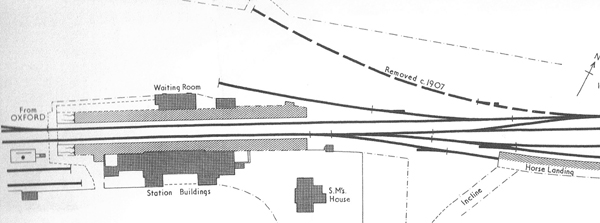
Winslow Station and sidings, 1907. The defunct siding at the top served a brickyard. Note the Horse Loading bay. From Dr R. Preston Hendry & R. Powell Hendry, An Historical Survey of LMS Stations (1982).
The origin of the Iron Bridge (removed in 2020) which replaced a previous wooden bridge
Bucks Herald, 5 Oct 1895
The very pretty curved “Chinese” bridge over the Railway between Winslow and Addington has been pulled down, and is being replaced by a plain straight iron one. The old bridge looked as if it might stand another fifty years, but then appearances are deceitful.
Bucks Herald, Saturday 1 Aug 1896
The Verney Arms at Verney Junction Opens
Business was commenced at the new hotel at Verney Junction on Monday. It is notorious that for many years the accommodation at this junction has been totally inadequate to the demands which has been placed on it by the increasing number of trains and traffic … It was generally felt that accommodation of other kinds, especially for horses and traps, was also urgently needed, and it is with a view to meet this demand that Messrs. Frank Higgens and Co. of Buckingham have erected the new hotel, which undoubtedly will prove of great convenience to the public. It is situate about twenty-five yards from the new station gates, and is on the angle of the Winslow and Claydon road, south of the station. It faces the latter, and in front stands a fine ash tree surrounded with an oval of grass round which runs the carriage drive. It has two bays, is built of Hartwell red bricks with stone sills, and slated with chimneys of blue brick ornamental heads. … The work has been satisfactorily executed by Messrs. Matthew Bros. of Winslow, in accordance with plans and specifications prepared by Mr Philip Inns of Stowe, who has personally superintended the work.
Bucks Herald, 30 Sep 1899: Complaints from Winslow RDC
THE RAILWAY ACCOMMODATION AT WINSLOW STATION.- The following memorial to the London and North-Western Railway Company was unanimously adopted:- “The Winslow Rural District Council desires especially to represent to the London and North-Western Railway Company the great necessity for some accommodation for the safer and more convenient loading and unloading of goods at the Company’s Station at Winslow. The present arrangements are very unsatisfactory, the men and horses having to cross and stand upon some part of the line while loading or unloading, which is difficult and unsafe, especially with young horses. As it is, often men cannot proceed with their work because of the shunting of engines and trucks upon the same line of metals from which they have to unload; this causes great inconvenience and hindrance, sometimes to the extent of two hours. The Council would respectfully suggest that if the Company could see its way to make some improvement it might easily and a very moderate outlay be done by making a side line on the left as you enter the gate by the goods shed connected with the line, from the corner of the embankment below (as shown upon the accompanying sketch). This would greatly facilitate the work of and be a convenience to those of the district who do business with the Company, and the Council think it would well repay the Company for the comparatively small expense it would entail…”
Another trade which was made possible by the railway was in blackberries.
Buckingham Advertiser, 20 Dec 1884
BLACKBERRYING.- It will surprise many of our readers to learn the quantity of this fruit from the hedge-rows in and around Winslow, sent from this station from September 18 to October 28, by Mr. B. Walker, and Mr. J. Walker. The latter sent from Winslow station 7 tons 3 cwt., 2 qrs., and 8 lbs., and paid carriage to the amount of £6 16s 9d. – Mr. B. Walker sent 3 tons 19 cwt. 3 qrs. and 20 lbs., and paid carriage amounting to £1 19 4d. The total weight sent by the two was 11 tons 3 cwt. 2 qrs., and the carriage £11 16s 1d. A good price was paid to the gatherers who must have benefitted thereby.
Bucks Herald, 7 Oct 1900
An interesting scene may be witnessed at Winslow passenger station almost daily again this year, in the shape of the dispatch of heaps of small baskets containing blackberries. One day this week I counted 300 baskets containing 61 lbs, 50 baskets of 10 lbs, and 200 baskets of 12 lbs. No less than 2,000 baskets were sent away this week to all parts of England. They are gathered from the wild brambles in the hedgerows by the women of the villages and taken to Mr John Walker, fruiterer, Winslow, who gives about 1d per lb, depending on the ripeness of the fruit. It is somewhat singular that the Transvaal crisis [i.e. the Boer War] should affect a little trade like this, but I understand it is a fact. Mr Walker having annually sent some hundreds of baskets to Johannesburg, till this year. The greater part of the fruit is now despatched to the North via Bletchley.
Bucks Advertiser and Aylesbury News, 27 Oct 1906
This year being a good blackberry one, numbers of people about Winslow have scoured the country round for miles gathering them. Dealers have also gone round and bought up the fruit and sent it wholesale to London, where we learn it is used for dying purposes. At the Railway Station at Winslow of late quantities of empty baskets were to be seen tied together, and within the station precincts, the blackberry stain was a feature to be seen. The sum of 1s. 4d. a peck is said to have been the price given to the collectors of berries.
The blackberry trade flourished for several decades until the First World War.
- In 1903 Mr Walker sent 5-6 tons per week from the station, and other dealers were involved too (Northampton Mercury, 30 Oct).
- In 1913 32½ tons were sent from Winslow Road Station in addition to what went by the LNWR (Luton Times, 28 Nov).
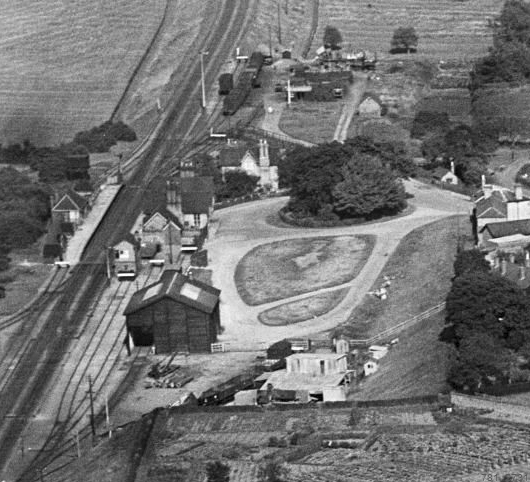
The Station seen from the air, 1931
Source: www.britainfromabove.org.uk/image/epw036312
Buckingham Advertiser, 1 Nov 1902: another fatal accident
On Friday an inquest was held at the Bugle Inn Great Horwood by Mr. T. F. Vaisey, on the body of James Mallett, aged 31, who died from the effects of injuries received at Winslow Station on the 22nd inst. Mr. Joseph Hanson was foreman of the jury. The following evidence was taken:-
William Foskett, porter at the London and North-Western Station, Winslow, said on the 29th September the deceased was loading [oil] cake at the station and witness was helping him. The shafts broke and the fore part of the cart dropped forward. Deceased got up and shifted the cake to the back of the cart to unload it, when the cake tilted up and wedged him between the cake and the wagon. Witness lifted the deceased out and pulled the cake off him. Deceased complained of his back and legs very much. Deceased left the cart and fetched another and tied the broken cart on behind and went home with it. Deceased had complained several times since of pain in his back, and said it was caused by the accident entirely. Deceased was not in the cart when the accident first happened. They were 2cwt. bags of oil cake and two or three of these bags fell on deceased’s stomach.
Buckingham Advertiser, 25 Sep 1909: suicide on the railway
The sad news quickly spread on Sunday morning [19 Sep] that the mutilated body of Arthur Walker had been found on the railway line near Winslow station. The deceased was 34 years of age and leaves a wife [Bertha] and little boy [Cyril] aged 8 years. He travelled the Buckingham, Bicester, Wolverton, and Winslow district in the wholesale fish and fruit business, his father, Mr. John Walker, Winslow, attending the London markets almost daily.
... Last Friday he visited Buckingham with his pony and trap, but was unable to dispose of the whole of his stock of fruit, and he left some in the buildings in the Three Cups yard.
... He left Winslow [on Saturday] by the 4.45 train for Buckingham, with the object he said of collecting some of the money that was due to him. He sold the goods he had left on the previous day to Mr. Mark Busby, receiving cash, as usual, from this firm. ... He left Buckingham by the 8.6 train, but before doing so he had a little friendly chat on the platform with Mr. Thomas Busby, who was despatching a number of baskets of mushrooms to the metropolis. ... On alighting at Winslow, he went into the Station Inn, and was served with a whisky and soda.
... It is surmised that after leaving the Station Inn he walked up Station Road, turned to the right by the Swan Inn, on to the Buckingham Road, and then, getting over the fence at the approach to the railway bridge, descended the embankment. ... The life-guard in front of the wheel of the engine [of the 2 a.m. goods train] caught the deceased.
... The body was found by one of the gangers [William Townsend] about 8 o’clock in the morning ... The body was removed to the Station Inn.
[Inquest held at the Police Court at 3pm on the Monday returned a verdict of suicide during temporary insanity.]
Buckingham Advertiser, 20 Nov 1909: big fire at the Tank House [between the end of the present-day Tank House Close and the railway embankment]
ALARMING FIRE.
Sometime during Friday evening a fire, which might have been a disastrous one, broke out at the pumping house of the L. and N.-W. Railway about a quarter of a mile from the Railway Station. The house consists of a massive tower of 18-inch brickwork, with engine and boiler house at bottom, dwelling-house above, and surmounted by an iron tank holding about 70,000 gallons of water, and which supplies the two loco tanks at the station. It is situate close to the Little Horwood Road, being some distance from the town that way, and is generally approached by a footway across the fields. Mr. Gayton, the engine-driver, having finished his day’s work, left home about 7.30 and went to the Institute, while Mrs. Gayton went to her father’s [John Turney], and as far as they knew the house was quite safe (the fire in the boiler was also low), but fire must have been smouldering for some time without having been noticed or seen by anyone, as the place has only a few small windows, which can only be seen from the railway or Little Horwood side; at any rate, when Mr. and Mrs. Gayton arrived home shortly after 11 p.m., although nothing could be seen outside, directly they opened the door the place was seen to be all on fire. Mr. Gayton at once got a hose and did his best to subdue the flames, but having originated in the bedrooms, the hose would not reach far enough. Mrs. Gayton in the meantime had run down to the station and aroused Mr. Theobald [station master], who as soon as he saw the fire dispatched a messenger for the Fire Brigade, the call being received about 10 minutes to one. Supt. Hancock came down immediately, and dispatched his son for horses, while he gave the alarm and opened the engine-house etc. Some little delay was experienced owing to Mr. Neal’s horses being out, but Mr Illing supplied one and Supt. Hancock the other, and the Brigade were soon off, reaching the fire at 1.30, just 37 minutes after the alarm was given. There was an abundance of water and some good pumpers, but by this time the place was one mass of fire inside. Mr. Gayton, knowing the house best, had the pipe, being held with a rope by 2nd Engineer Scott and the Superintendent, who had to pull him out half unconscious several times, and Scott also was overcome more than once with the heat and smoke. The L. and N.-W. engine and brigade from Bletchley arrived by special train while the fire was full on and were able to play on the walls, which by this time were nearly red hot, the danger being that the whole building, with its tremendous weight of water on top, would collapse, in which case there must inevitably have been considerable loss of life. So hot, in fact, was the building that the water in the tank must have been almost at boiling point. But by about an hour and a half’s time all danger was over, the fire was practically out, and the massive brickwork showed no signs of giving way, bearing testimony to the excellent way in which it must have been erected, while the boiler, engine and pump down below were practically uninjured, and were able to be started on Saturday morning. The tank itself, however, leaks badly, and Mr. Gayton has lost everything except some money in a cash box, which was fortunately found in the ashes. He was not insured, and much sympathy is felt for him. His dog and cat were in the house; the former managed to escape, but the cat was killed. Much credit is due to the Fire Brigade, who undoubtedly saved the building and the valuable machinery. The pumpers also worked well, pumping for two hours without a stop. The actual cause of the fire is unknown, but it evidently commenced in the bedroom over the boiler, a room which is always more or less hot. The fire was practically over by about 4.30 on Saturday morning.
In the 1911 Census, George William Ernest Gayton aged 39, married 14 years, stationary engineman, and his wife Fanny Elizabeth Gayton aged 39, both born in Winslow, lived at the Engine House, listed as having 3 rooms.
Buckingham Advertiser, 30 April 1910
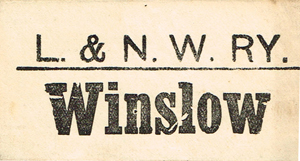 OBITUARY.- We regret to note the death of Mr. William Odell, for many years outside porter at the railway station and agent for Messrs. Sutton and Co., carriers. The son of the late Mr. Geo. Odell, well known years ago as the driver of the “Bell” fly, William became luggage porter at quite an early age, and was well known to every commercial traveller who came into Winslow as a very trustworthy and dependable man, even if slightly eccentric in some of his ways. During the windy weather of February he was struck on the head by a tile as he was going along the street, and from this he never really recovered, being taken with a fit on Saturday last and then another on Sunday, on which day he passed away.
OBITUARY.- We regret to note the death of Mr. William Odell, for many years outside porter at the railway station and agent for Messrs. Sutton and Co., carriers. The son of the late Mr. Geo. Odell, well known years ago as the driver of the “Bell” fly, William became luggage porter at quite an early age, and was well known to every commercial traveller who came into Winslow as a very trustworthy and dependable man, even if slightly eccentric in some of his ways. During the windy weather of February he was struck on the head by a tile as he was going along the street, and from this he never really recovered, being taken with a fit on Saturday last and then another on Sunday, on which day he passed away.
In 1947 there were 9 trains a day from Winslow to Bletchley, and you could get to Euston in 90 minutes if you travelled at the right time:
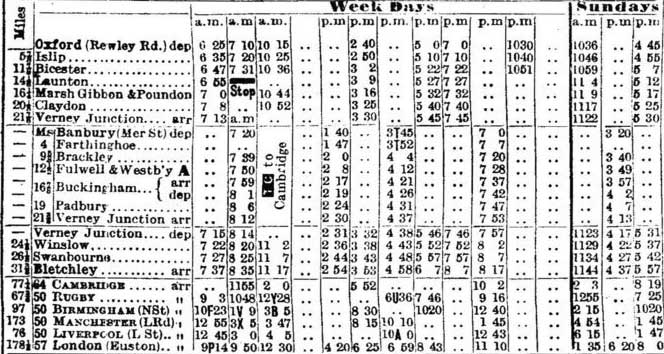
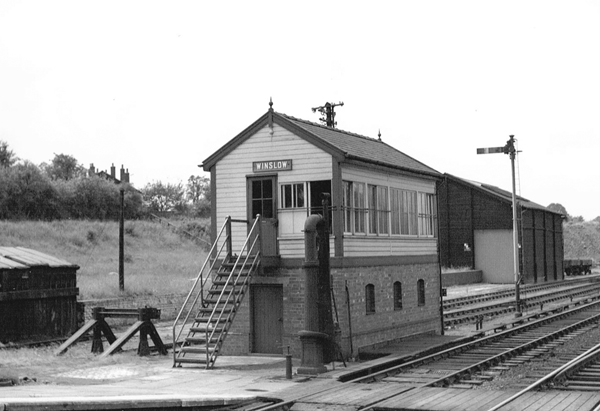
Winslow signal box, photographed in 1959
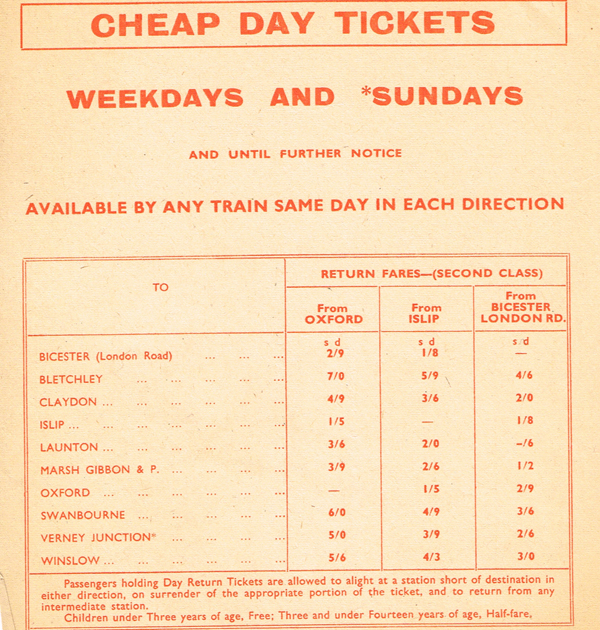
Oxford to Winslow return for 5s 6d (1956), from British Railways
In 1958, cheap Saturday trips to Bedford were on offer |
Similar deals were available in 1965 |
Some of the tickets issued on the last day of passenger services |
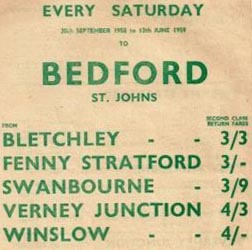 |
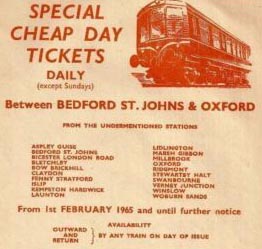 |
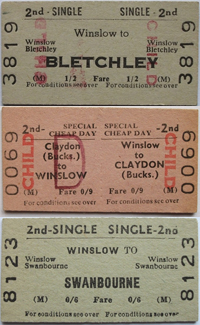 |
The last passenger train ran on 30 Dec 1967: it was the 23:45 to Bletchley. You can hear some extracts from a recording made that day.
The first part of the recording is the last minutes of the signal box: signals are pulled off for a fast train to Oxford, then a train for Bletchley comes through, bells clang and the needles are switched off. The second part is the last train, the 23:45 for Bletchley, stopping at the station, with some detonators going off behind it.
The line was used for goods trains and occasional passenger specials until the early 1990s.
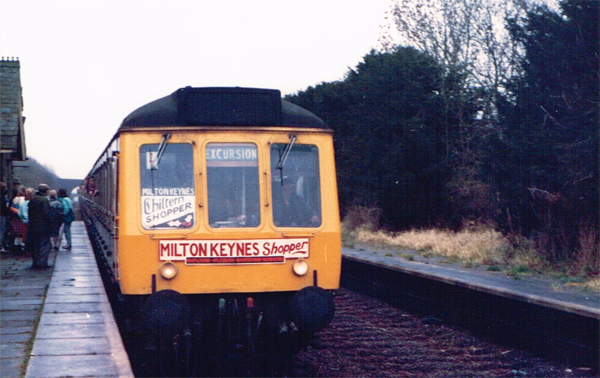
A Milton Keynes Shopper train stops at Winslow, c.1987
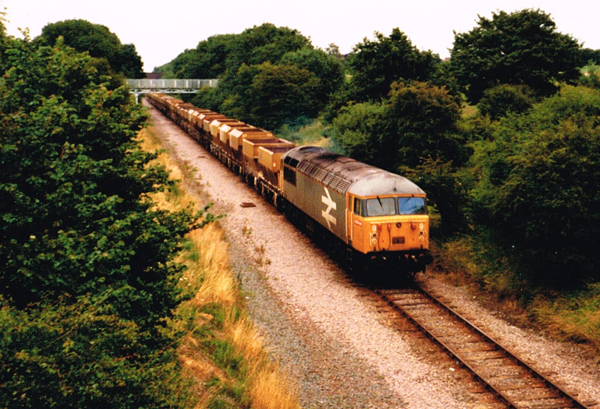
An Amey Roadstone train on the now single-track line passes under the Iron Bridge between Furze Lane and Buckingham Road, c.1988
See also:
- Station Road
- Winslow Station on the Disused Stations website
- Winslow railway station on Wikipedia
- Timetable World (old railway timetables)
Winslow Road Station
Winslow's second station, Winslow Road, between Winslow and East Claydon, was opened in 1868 on the Aylesbury & Buckingham Railway (part of the Metropolitan Railway from 1891). The proposed line was first discussed in 1853:
1853, Bucks Chronicle, 26 Nov
THE PROJECTED RAILWAY
Our readers are aware that a direct line, on the narrow gauge, from Oxford to London, through Wycombe, with a branch by Risborough to Aylesbury, and powers for one to Amersham, will be promoted this Session by the London and North Western, the Oxford, Worcester, and Wolverhampton Companies, and most of the influential Landowners, who last year formed part of the Board of the Mid-Western scheme. The cordial alliance with the North Western Company, has thus secured to this line the use of the Euston-square terminus, with its enormous contingent advantages. Though not included in the scheme of this session, it is evident that the line must eventually be extended from Aylesbury to Winslow.
1868, Oxford Chronicle, 3 Oct
NEW ROUTE TO AYLESBURY.- The new line of railway branching off from Winslow and running through the Vale of Aylesbury, was opened for traffic on Thursday last. The line is about 8 miles in length. Three trains in connection with the Buckinghamshire railway, run each way daily.
A horse-drawn vehicle called the Fly Coach provided a connection from The Bell. There was a through service to London (Baker Street) from 1892. The line was a commercial failure and closed to passengers in 1936. Winslow Road Station had a footbridge, unlike Winslow Station where you had to walk across the tracks at a "barrow crossing". The first photo (looking north) shows the station before it was upgraded in the 1890s, and the second (looking south) is later.
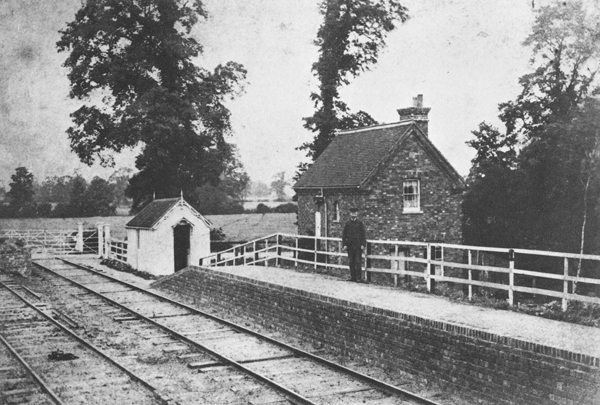
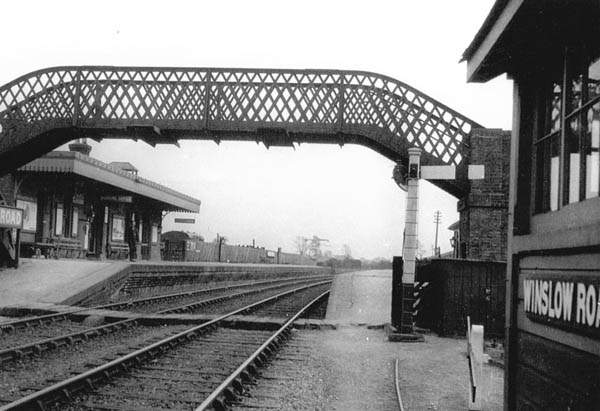
1895: Bucks Herald, 5 Oct
Travellers by the Metropolitan Railway to Verney Junction will soon see a great change. At Winslow Road a commodious station, which will be quite equal to that on the L. and N. Western at Winslow, is in course of erection. At the junction itself I cannot hear of anything being as yet done to the Station, but the old Condensed Milk Factory is coming down, and is, I hear, to be replaced by a block of cottages. If this is correct, Verney Junction, with its hotel as well, will be quite a different spot.
1911: Buckingham Advertiser, 1 April,
PROPOSED CATTLE DOCK AND SIDING AT WINSLOW ROAD.
An additional cattle dock and siding at Winslow Road Station have been officially sanctioned by the Railway Company, and the work will shortly be commenced. The accommodation will then include horse and carriage landing, a cattle dock, and room for a limited number of other wagons.
1918: death of George Edwin Green, stationmaster. Grant of probate.
For more information and photos, see the Disused Stations website.
Some of the information on this page comes from C.G. Maggs, The Branch Lines of Buckinghamshire (Chalford: Amberley, 2010).
